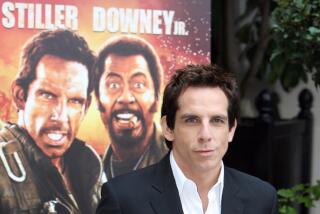Take Pause Before Fixing Grammar: Who Says It’s Broke?
- Share via
The language cops have been busy again:
Edeltraud Joyce underlines the phrase like us from one of my columns and also the phrase like me from a headline. “Let me suggest,” he says, “that you use your idle afternoon hours to brush up on your grammar.”
Like is a preposition. It takes the objective case. Both like us and like me are correct.
“In your article of 17 October,” writes Ernie Alvarez, “you wrote: ‘It was a good place to see the umbrellas from.’ Should one end a sentence with a preposition? My English teachers would correct us if one in the class would say or write: ‘Where are you at?’ ”
The rule against ending a sentence with a preposition is one of Mrs. Thistlebottom’s hobgoblins. As I have noted before, a preposition is often a good thing to end a sentence with.
“Where are you at?” is objectionable not because it ends in a preposition but because it is redundant. “Where are you?” is enough.
D. Maltzman objects to a headline, “If It Ain’t Broke, Don’t Replace Part,” over the Your Wheels column. “This isn’t cute,” this reader complains. “Errors in, and misuse of, language are becoming the norm, just in case you haven’t noticed.”
The current cliche is “If it ain’t broke, don’t fix it.” A sound piece of wisdom, forcefully expressed. A pox on those who express it as “If it isn’t broken, don’t fix it.”
Donald R. Lehti questions the sentence: “One in seven are now living in poverty.” He asks, “Shouldn’t it be is ?”
One in seven Americans are about 35 million Americans.
An anonymous reader quotes an “egregious” sentence from The Times: “None of the 19 Republicans in California’s congressional delegation are a woman.” None may be construed as either singular or plural, but “None . . . are a woman” is indeed egregious.
Walter D. Douglas questions the phrase “one of the only. . . . “ He asks, “Shouldn’t it be ‘one of the few’?” Yes.
Michael Thompson writes that he is dismayed to find me guilty of double punctuation, as in “Go Lakers!, Go Lakers!” He quotes me as writing “One simply pushes the spaghetti up against one’s upper incisors with one’s tongue, and, voila!, the elusive pasta plops to the plate.”
Heavens!, did I do that?!
Betty Murphy writes that her pet peeve, common in The Times, is the use of lay when lie is called for. She sends clippings of several examples. The use of lay for lie may be the most common grammatical error in our language. Undoubtedly it is on the way to becoming standard.
Michele Mooney, a summa cum laude member of Phi Kappa Phi honor society, writes that she received a letter announcing that the certificates were ready. It began: “There here!”
Mooney finds this especially depressing for a society that boasts: “The society serves the interest of the student capable of excellence by insisting that in order to acquire a chapter of Phi Kappa Phi, an institution provide the means and atmosphere conducive to academic excellence.”
Sydney E. Westman questions my quoting, in a column defending the ungrammatical titles of popular songs, the title of a George Gershwin song as “S’wonderful.” He identifies this, correctly, as one of the most common of punctuation errors--the misplaced apostrophe. He points out that the title is surely “ ‘Swonderful,” the apostrophe indicating the omitted It . Yes, but not quite. The title, as quoted in the ASCAP biographical dictionary, is “ ‘S Wonderful.”
However, I’m embarrassed. I rarely misplace an apostrophe. There is no sign in front of my house reading: “The Smith’s.”
Michele Mooney coincidentally sends me several printed examples of the phrase “do’s and don’ts,” evidently objecting to the apostrophe in do’s . Although it is not a function of the apostrophe to indicate plurals, the dictionary honors do’s , I suppose because dos would automatically be pronounced doss .
Richard H. Harrison of North Hollywood takes me to task for a misuse of the word acronym. He points out that in writing about an organization called the Straight White Male Defense Fund, I said that unfortunately its acronym (SWMDF) was unpronounceable.
“An acronym must be a pronounceable word,” he says. “So how can you say it’s an acronym?”
True. According to the dictionary an acronym is “a word formed from the first (or first few) letters of a series of words, as radar , from radio detecting and ranging.”
So SWMDF is not a word and thus not an acronym. But what about MADD (Mothers Against Drunk Drivers)? That’s not a true acronym, since it’s misspelled; but its meaning is quite clear. For that matter, you can pronounce SWMDF is you really try.
Anyway it’s an organization whose time has come.
More to Read
Sign up for Essential California
The most important California stories and recommendations in your inbox every morning.
You may occasionally receive promotional content from the Los Angeles Times.










